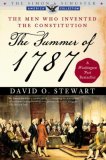Summary | Excerpt | Reviews | Beyond the Book | Readalikes | Genres & Themes | Author Bio

Critics' Opinion:
Readers' Opinion:
First Published:
Apr 2007, 368 pages
Paperback:
May 2008, 368 pages
 Book Reviewed by:
Book Reviewed by:
BookBrowse Review Team
Buy This Book
The city that greeted them was a worldly one. Ships filled Philadelphia's port on the Delaware River, discharging exotic cargoes and crew members. Like any city of its time, it was no Arcadian paradise. "The streets and alleys reeked of garbage, manure, and night soil," and water wells "must have been dangerously polluted." A few years before the Convention, a Philadelphian complained that on the streets "dead dogs, cats, fowls, and the offals of the market are among the cleanest articles to be found. Dead animals -- horses and cows -- are left to putrefy on vacant lots." Pigs running free consumed some of the street refuse. No wonder that General Washington started a practice of Sunday rides in the countryside. On Wednesday, May 23, he sneaked off for a midweek ride with Madison, John Rutledge, and some others, though many times he rode alone.
Philadelphia had a lurid reputation for disease. Yellow fever had struck in 1747 and 1762, and a devastating epidemic would spread in 1793. At least two delegates -- one from Connecticut and one from Maryland -- refused to attend the Convention because they feared the city's contagion. "Having never had the small pox," the Connecticut appointee wrote, referring to himself in the third person, "a disorder to which he would be greatly exposed in the City, . . . he cannot suppose it would be prudent for him to hazard his life." By August, Elbridge Gerry of Massachusetts called the city "very sickly" for children, "a great number of whom had died."
Some visitors found the city visually dull, built on a rectangular grid of streets laid out by William Penn when the colony was founded. A German carped, "[T]here is nothing but streets all alike, the houses of brick, of the same height mostly, and built by a plan that seldom varies." Still, visitors admired the frequency of public pumps for water service. To fight crime, the roads were lit with whale-oil lamps and patrolling constables called out the hour and the state of the weather.
Crime and its consequences were often before the delegates, as the Walnut Street prison stood behind the State House. The inmates called to passing delegates "with Billingsgate language," extending "long reedpoles, with a little cap of cloth at the end" to solicit donations. A citizen who failed to deposit alms would trigger "the most foul and horrid imprecations." In March of 1787, eighteen inmates escaped through and over the prison's walls, prompting municipal consternation. On May 12, the day before General Washington arrived, Philadelphia hanged one Robert Eliot for a burglary he committed before the laws were made "less sanguinary." Even sanguinary punishments proved an incomplete deterrent to crime. In late June, a newspaper reported that a "nest of footpads" was attacking citizens near Broad Street.
More pleasant were the city's bells. Christ Church in Second Street had a full octave of chimes, and "[a]t Philadelphia there is always something to be chimed, so that it seems as if it was an Imperial or Popish city."
Twice a week, the evening bells would announce the next morning's market (held on Wednesdays and Saturdays). Visitors marveled at the market, which extended for two roofed blocks in the middle of town. "Everything is adjusted in perfect order, and as neat and clean as a dining-hall." A Frenchman wrote home, "Even meat, which looks so disgusting in all other markets, has an attractive appearance." The offerings included raccoon, opossum, fish-otter, bear-bacon, and bear's foot. The orderliness of the people also drew favorable comment, with one guest writing, "One would think it is a market of brothers."
The inns and taverns were the social hubs of the city, particularly for long-term visitors like the delegates. In 1774, Philadelphia had a tavern for every 140 residents. The better inns were full in the summer of 1787, forcing some delegates to share rooms. A Delaware delegate described Mrs. House's establishment as "very crowded, and the room I am presently in [is] so small as not to admit of a second bed." Some roommates were decidedly unwelcome. A British traveler in the 1790s recorded that his room at the City Tavern (one of Philadelphia's premier hostelries) included his "old tormenters, the bugs."
Copyright © 2007 by David O. Stewart





The House on Biscayne Bay
by Chanel Cleeton
As death stalks a gothic mansion in Miami, the lives of two women intertwine as the past and present collide.

The Flower Sisters
by Michelle Collins Anderson
From the new Fannie Flagg of the Ozarks, a richly-woven story of family, forgiveness, and reinvention.

The Funeral Cryer by Wenyan Lu
Debut novelist Wenyan Lu brings us this witty yet profound story about one woman's midlife reawakening in contemporary rural China.
Your guide toexceptional books
BookBrowse seeks out and recommends the best in contemporary fiction and nonfiction—books that not only engage and entertain but also deepen our understanding of ourselves and the world around us.